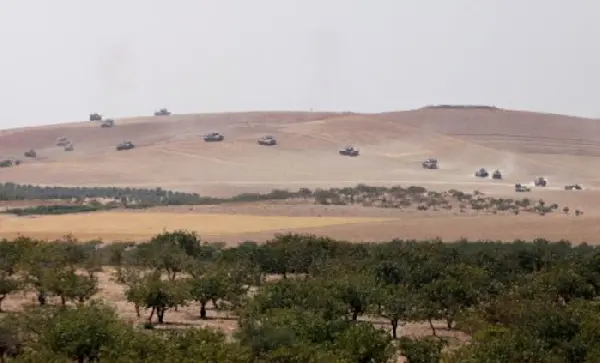
|
| Turkish army tanks make their way in the Syrian border town of Jarablus (Reuters) |
ANKARA — Turkish special forces, tanks and jets backed by planes from the U.S.-led coalition launched their first co-ordinated offensive into Syria on Wednesday to try to drive ISIS from the border and prevent further gains by Kurdish militia fighters.
A column of at least nine Turkish tanks crossed into northern Syria with Turkish-backed Syrian rebels to push ISIS out of the border town of Jarablus, military sources said. A Reuters reporter at the border witnessed intense bombardments, with palls of black smoke rising around the town.
President Tayyip Erdogan said the operation was targeting ISIS and the Kurdish PYD party, whose gains in northern Syria have alarmed Turkey. Ankara views the PYD as an extension of Kurdish militants fighting an insurgency on its own soil, putting it at odds with Washington, which sees the group as an ally in the fight against ISIS.
“This morning at 4 a.m. an operation started in northern Syria against terror groups which constantly threaten our country, like Daesh and the PYD,” Erdogan said in a speech in Ankara.
U.S. Vice President Joe Biden arrived in Turkey, which has NATO’s second biggest armed forces, hours after operations began on a pre-planned trip. Biden is the most senior U.S. official to visit since a failed July 15 coup shook confidence in Turkey’s ability to step up the fight against Islamic State.
“Euphrates Shield”, named after the river running nearby, is Turkey’s first major military operation since the abortive coup. A military source said the Turkish-backed rebels had seized control of four villages as they pushed towards Jarablus.
The offensive by Turkey comes four days after a suicide bomber suspected of links to ISIS killed 54 people at a wedding in the southeastern city of Gaziantep.
Syria’s foreign ministry condemned what it said was a breach of its sovereignty and accused Ankara of launching the incursion to replace ISIS with “other terrorist groups.”
A senior U.S. official traveling with Biden said the United States wanted to help Turkey to get Islamic State away from the border, and was providing air cover and “synching up” with the Turks on their plans for Jarablus. The shelling was hitting ISIS, not Kurdish forces, he said.
Biden’s visit comes at a testing time for Turkish-U.S. relations. Turkey says the failed putsch was staged by Muslim cleric Fethullah Gulen, who has lived in self-imposed exile in Pennsylvania for the past 17 years.
It was the first time warplanes from Turkey have struck in Syria since November, when Turkey downed a Russian warplane near the border, and the first significant incursion by Turkish special forces since a brief operation to relocate the tomb of Suleyman Shah, a revered Ottoman figure, in February 2015.
Turkey and the United States hope that by removing Islamic State from the border, they can deprive it of a smuggling route which long saw its ranks swollen with foreign fighters and its coffers boosted by illicit trade.
But for Turkey, it also preempts any attempt by Syrian Kurdish militia fighters, who play a critical part of the U.S.-backed campaign against ISIS, to take Jarablus.
Kurdish fighters have captured large areas of territory since the start of the Syrian conflict in 2011, and Ankara has long declared the Euphrates river, which runs just east of Jarablus, a red line which it does not want them to cross.
Foreign Minister Mevlut Cavusoglu said Kurdish fighters must return east of the Euphrates or Turkey would “do what is necessary”. He said the operation was a turning point and would accelerate removing Islamic State from Syria’s Aleppo region.
Saleh Muslim, head of the Kurdish PYD, wrote in a tweet that Turkey was entering a “quagmire” in Syria and faced defeat there like ISIS. Redur Xelil, spokesman for the Syrian Kurdish YPG militia, said the intervention was a “blatant aggression in Syrian internal affairs.”






Leave a Reply